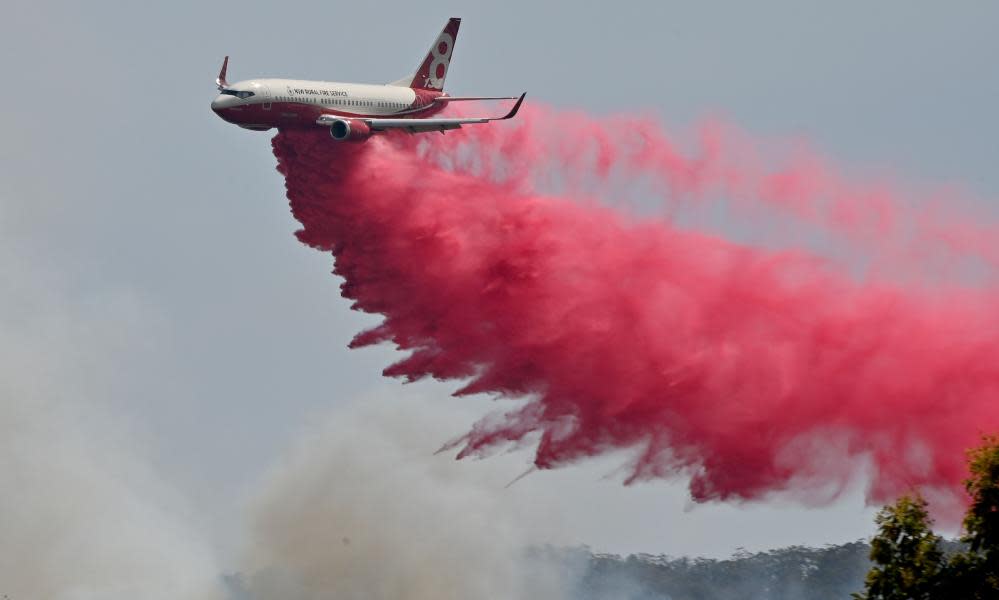Bushfires: Coalition responds to calls for more water bombers with $11m aerial firefighting boost

Australia’s aerial firefighting force has been given an $11m funding injection from the Morrison government amid growing concern about the resourcing of firefighters combating the bushfire crisis.
On Thursday the federal government announced it would nearly double the commonwealth’s annual contribution to the National Aerial Firefighting Centre, which coordinated the 140 aircraft used to battle fires across Australia.
“In response to the request from our national fire chiefs we’re backing our firefighters and our water-bombing fleet with an extra $11m boost,” the prime minister, Scott Morrison said in a statement.
Related: 'Doing nothing is not a solution': Matt Kean blames climate crisis for bushfires
“That’s on top of the $15m we already deliver each year for aerial firefighting to tackle what has already been a devastating fire season.”
The funding injection comes as fires continue to rage across the east coast of Australia. In New South Wales six people have been killed and more than 720 homes destroyed since last month.
On Tuesday as smoke brought Sydney’s air quality to more than 11 times the hazardous level, Morrison had rejected calls for more help for firefighters, saying firefighters “want to be out there”.
On Thursday former NSW Rural Fire Service chief Greg Mullins welcomed the funding but said a business case put forward by fire chiefs for the extra money had been “languishing” in Canberra.
Mullins is one of a coalition of former fire and emergency leaders to have been calling on the government to do more to address the climate crisis. In November he and other retired fire chiefs said they had tried for months to warn Prime Minister Scott Morrison that Australia needed more water-bombers.
Related: Scott Morrison and the Coalition are fiddling as Australia burns | Katharine Murphy
“This is what the emergency chiefs warned of, simultaneous fires because of climate change,” he told the ABC on Thursday.
“Fire seasons are overlapping and trying to share eight air craft between all the stares and territories if they’re all burning at one that’s going to be a problem.”
While he was glad the extra funding had been granted, Mullins accused the government of ignoring the problem in the lead up to the summer, saying a business proposal for the extra funding had “sat there for 18 months without any action”.
While he said resourcing of fire agencies was better than the past “because we’ve got better technology [and] better arrangements”, it was not keeping up with the danger posed by bushfires as a result of climate change.
“You just have to look out the window and say well is it working,” he said.
“Things are far, far worse, they’re going to stay worse [and] they’re going to get even worse in the future.”
The Coalition has come under fire for its reluctance to talk about climate change in relation to the bushfire crisis, and Mullins said that as fire chief he had been “advised” to alter business cases not to mention it because “cert politicians don’t want to talk about that and it’ll lessen their ability to be approved”.
Also on Thursday the Sydney Morning Herald reported that NSW environment minister Matt Kean would push his government to commit to lowering greenhouse gases by 35% by 2030.
Kean this week broke ranks with his Coalition colleagues by linking the bushfire crisis to climate change, saying it was “not normal”.
The minister for natural disasters, David Littleproud, said the additional funding would allow lease periods of firefighting aircraft to be extended.
“It is clear we are facing longer and more intense seasons, and as this summer has only just begun we have already seen devastating fires tear through communities right across the country,” Littleproud said.
“Sadly, bushfires are part of the Australian landscape and while we cannot always prevent them, we can prepare for them and ensure that we are responding in the most effective way.”

 Yahoo News
Yahoo News 
